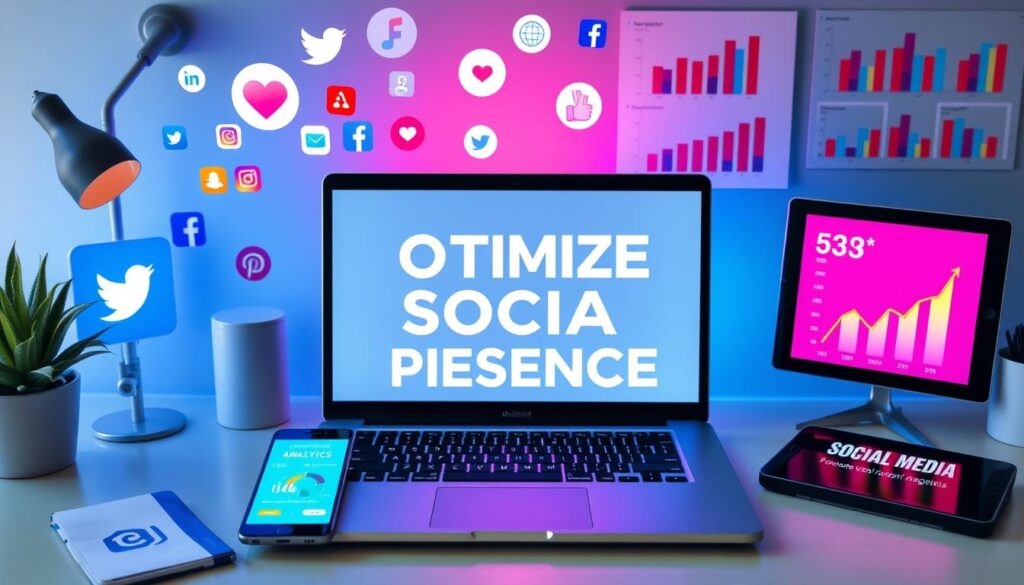|
Getting your Trinity Audio player ready...
|
Are you missing out on money by ignoring social media in your affiliate marketing? Many marketers don’t see the value of social platforms. But, they’re missing a huge opportunity. Let’s look at how to use social media to boost your affiliate sales.
Social media has changed how we connect and shop. For affiliate marketers, it’s a big deal. By using social media to boost your affiliate sales, you reach many people looking for product tips. The trick is to make content that your followers love and also promotes your affiliate links.
Good affiliate marketing on social media is more than just sharing links. It’s about building trust, showing your knowledge, and creating a community. With the right strategy, social media can make your affiliate business grow. It can bring in more traffic and sales than ever before.
Understanding the Power of Social Media in Affiliate Marketing
Social media has changed affiliate marketing a lot. It gives you new ways to reach people and connect with them. Let’s see how social media can help boost your affiliate sales.
Social Platforms and Affiliate Programs: A Perfect Match
Social media and affiliate marketing are a great team. Sites like Instagram, Facebook, and Twitter let you show off products in a natural way. You can share reviews, tutorials, and lifestyle stuff that quietly promotes your affiliate links. This approach builds trust with your followers.
Metrics That Matter for Affiliate Sales
It’s important to track the right numbers. Look at engagement rates, click-through rates, and conversion rates. These numbers show how well you’re doing on social media. When you get high engagement, you often see better affiliate sales.
The Game-Changing Impact of Social Media
Social media has really changed affiliate marketing. It lets you talk directly to your audience, interact in real time, and learn about what people like. By using these tools, you can make your affiliate marketing campaigns better and increase your sales a lot.
Choosing the Right Social Media Platforms for Your Niche
Finding the right social media platforms is key for affiliate marketers. Each platform has its own features and audience. So, picking the right one is crucial.

Facebook has a wide user base and strong ads. It’s perfect for sharing detailed content and building communities. Instagram is great for showing off products and lifestyle content, especially for fashion, beauty, and travel.
Twitter is fast-paced, ideal for news and tech products. It’s great for quick updates and discussions. LinkedIn is for professionals, making it good for B2B products and services.
Think about where your audience hangs out. Look into demographics and user behavior to choose wisely. Quality is more important than quantity. Focus on a few platforms where you can really shine.
Content for affiliates needs to vary by platform. Use Instagram for eye-catching images, YouTube for videos, and Twitter for threads. Tailoring your content to each platform can boost your affiliate marketing on social media.
Creating Compelling Content That Drives Affiliate Sales
Content Creation for Affiliates is key in today’s digital world. You must make engaging posts that connect with your audience and promote products well. Let’s look at how to find this balance and boost your affiliate marketing.
Balancing Promotional and Value-Driven Content
Your content should give real value to your followers. Mix informative posts with subtle product mentions. For example, share tips on using a product to solve a common problem. This builds trust and boosts conversion chances.
Leveraging Different Content Formats
Variety is important when engaging audiences on social platforms. Use videos, images, and stories to keep your content interesting. Short product demos, behind-the-scenes looks, and user testimonials can drive engagement and sales.
Storytelling Techniques That Resonate
People connect with stories. Share your personal experiences with products or highlight customer success stories. This emotional connection can motivate purchases. Remember, being authentic is key in affiliate marketing. Your audience will value genuine recommendations over hard sells.
By focusing on these strategies, you’ll create content that promotes products and provides real value. This approach builds stronger relationships with your followers and leads to more successful affiliate campaigns.
Building and Nurturing Your Social Media Community

Your social media community is key to your success in affiliate marketing. By engaging with your audience, you build a loyal group that trusts your advice. Start by sharing content that meets your audience’s needs and interests.
This approach boosts your credibility and keeps followers interested. It’s all about creating a relationship that leads to sales.
Interaction is vital for growing your community. Answer comments, ask questions, and start polls to get conversations going. This makes your followers feel important and heard.
Using user-generated content is also powerful. Ask followers to share their experiences with products you promote. Then, repost their photos, testimonials, and success stories.
This not only proves your products work but also makes your followers feel part of your brand. Remember, being consistent is important. Keep a regular posting schedule and stay true to your brand’s voice.
This consistency creates a sense of familiarity and reliability. With time and effort, you’ll have a supportive community where your affiliate products can succeed.
Using Social Media To Boost Affiliate Sales: Proven Strategies
Social media is a great tool for affiliate marketers to make more sales. By using smart strategies, you can reach more people and get more sales.
Crafting persuasive calls-to-action
Make your calls-to-action exciting and motivating. Use words that make people want to click on your links. For instance, “Discover the secret to flawless skin” or “Transform your home office with this must-have gadget.”
Timing your posts for optimal reach
Post when your followers are most likely to see your content. Look at your account insights to find the best times. Try different times and see what works best for you.
Utilizing social media features
Use special features on each platform to show off your products. For example, Instagram Stories for demos, Facebook Live for Q&As, or Pinterest boards for collections. These formats can really grab people’s attention and help your sales.
By using these strategies, you can make your social media work better for your affiliate marketing. This can help you earn more money.
Leveraging Influencer Partnerships for Affiliate Success

Influencer collaborations can really help increase your affiliate sales. By working with influential people in your field, you can reach more people. They can help show off your products to their followers.
To begin, find influencers who share your brand’s values. Look for those with a big and active following in your area. Send them a personalized message, explaining how working together can help both of you.
When planning your influencer campaign, make sure the content fits their audience. This could be product reviews, tutorials, or sneak peeks. Ask influencers to share their real thoughts on your products. This builds trust and credibility.
Social media is crucial in influencer partnerships. Work with your chosen influencers to make a plan for different platforms. This could be Instagram stories, YouTube videos, or Twitter chats. The aim is to create excitement and get more people to visit your affiliate links.
Keep a close eye on how your influencer partnerships are doing. Look at things like engagement, clicks, and sales. Use this info to improve your strategy for future partnerships. With the right plan, influencer marketing can really help your affiliate success.
Optimizing Your Social Media Profiles for Affiliate Marketing
Your social media profiles are key for driving traffic and boosting affiliate sales. By optimizing your social media, you can attract potential customers. You can also showcase your top-performing products well.
Crafting a bio that attracts potential customers
Your bio is your first impression. Make it count by clearly stating what you offer and how you can help. Use keywords related to your niche and include a call-to-action. This encourages profile visitors to explore your content or visit your website.
Strategically placing affiliate links in your profile
Use your profile’s link section wisely. Instead of directly posting affiliate links, create a landing page on your website. This showcases your top recommendations and looks more professional. It also allows you to track clicks more effectively.
Using highlight features to showcase top-performing products
Many social platforms offer highlight or story features. Use these to create engaging content about your best-performing affiliate products. Share honest reviews, tutorials, or behind-the-scenes looks. This builds trust and drives interest in your recommendations.
By focusing on optimizing your social media presence, you’ll be better equipped for driving traffic via social media to your affiliate offers. Remember to keep your profiles updated and aligned with your overall brand image for maximum impact.
Analyzing and Improving Your Social Media Affiliate Performance
Tracking your social media affiliate marketing efforts is key to success. By watching key performance indicators (KPIs), you learn what works and what doesn’t. Look at engagement rates, click-through rates, and conversion rates closely.
To make your affiliate marketing better, use data to guide your social media campaigns. Tools like Google Analytics and social media insights show how well your posts do. Find out which content, times, and promotions lead to more sales.
Regularly check your data to spot trends and patterns. This helps you improve your campaigns. Don’t hesitate to try new things and learn from both wins and losses. By always improving based on real data, you’ll increase your affiliate sales on social media.
Improving your social media affiliate performance takes time and effort. Keep up with platform changes and trends to stay ahead. With ongoing effort and data-driven choices, your affiliate marketing success will grow.

